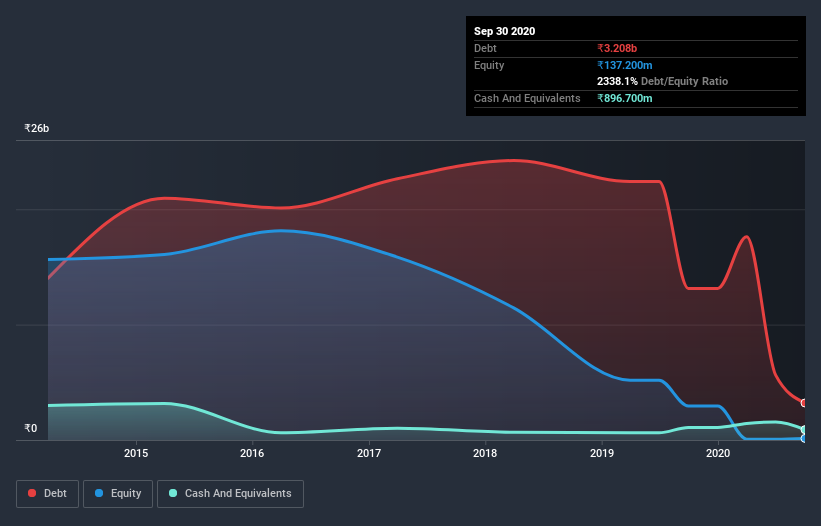
Some say volatility, rather than debt, is the best way to think about risk as an investor, but Warren Buffett famously said that 'Volatility is far from synonymous with risk.' So it might be obvious that you need to consider debt, when you think about how risky any given stock is, because too much debt can sink a company. We note that Peninsula Land Limited (NSE:PENINLAND) does have debt on its balance sheet. But is this debt a concern to shareholders?
What Risk Does Debt Bring?
Debt is a tool to help businesses grow, but if a business is incapable of paying off its lenders, then it exists at their mercy. Part and parcel of capitalism is the process of 'creative destruction' where failed businesses are mercilessly liquidated by their bankers. However, a more usual (but still expensive) situation is where a company must dilute shareholders at a cheap share price simply to get debt under control. Of course, debt can be an important tool in businesses, particularly capital heavy businesses. The first thing to do when considering how much debt a business uses is to look at its cash and debt together.
See our latest analysis for Peninsula Land
What Is Peninsula Land's Net Debt?
The image below, which you can click on for greater detail, shows that Peninsula Land had debt of ₹3.21b at the end of September 2020, a reduction from ₹13.1b over a year. However, it also had ₹896.7m in cash, and so its net debt is ₹2.31b.

How Strong Is Peninsula Land's Balance Sheet?
The latest balance sheet data shows that Peninsula Land had liabilities of ₹24.2b due within a year, and liabilities of ₹312.0m falling due after that. Offsetting these obligations, it had cash of ₹896.7m as well as receivables valued at ₹321.0m due within 12 months. So it has liabilities totalling ₹23.3b more than its cash and near-term receivables, combined.
The deficiency here weighs heavily on the ₹1.78b company itself, as if a child were struggling under the weight of an enormous back-pack full of books, his sports gear, and a trumpet. So we'd watch its balance sheet closely, without a doubt. After all, Peninsula Land would likely require a major re-capitalisation if it had to pay its creditors today. There's no doubt that we learn most about debt from the balance sheet. But you can't view debt in total isolation; since Peninsula Land will need earnings to service that debt. So if you're keen to discover more about its earnings, it might be worth checking out this graph of its long term earnings trend.
Over 12 months, Peninsula Land reported revenue of ₹5.3b, which is a gain of 139%, although it did not report any earnings before interest and tax. So its pretty obvious shareholders are hoping for more growth!
Caveat Emptor
Despite the top line growth, Peninsula Land still had an earnings before interest and tax (EBIT) loss over the last year. Its EBIT loss was a whopping ₹3.1b. When you combine this with the very significant balance sheet liabilities mentioned above, we are so wary of it that we are basically at a loss for the right words. Sure, the company might have a nice story about how they are going on to a brighter future. But the reality is that it is low on liquid assets relative to liabilities, and it lost ₹2.5b in the last year. So we're not very excited about owning this stock. Its too risky for us. There's no doubt that we learn most about debt from the balance sheet. However, not all investment risk resides within the balance sheet - far from it. For example, we've discovered 3 warning signs for Peninsula Land (1 can't be ignored!) that you should be aware of before investing here.
If, after all that, you're more interested in a fast growing company with a rock-solid balance sheet, then check out our list of net cash growth stocks without delay.
When trading Peninsula Land or any other investment, use the platform considered by many to be the Professional's Gateway to the Worlds Market, Interactive Brokers. You get the lowest-cost* trading on stocks, options, futures, forex, bonds and funds worldwide from a single integrated account. Promoted
New: Manage All Your Stock Portfolios in One Place
We've created the ultimate portfolio companion for stock investors, and it's free.
• Connect an unlimited number of Portfolios and see your total in one currency
• Be alerted to new Warning Signs or Risks via email or mobile
• Track the Fair Value of your stocks
This article by Simply Wall St is general in nature. It does not constitute a recommendation to buy or sell any stock, and does not take account of your objectives, or your financial situation. We aim to bring you long-term focused analysis driven by fundamental data. Note that our analysis may not factor in the latest price-sensitive company announcements or qualitative material. Simply Wall St has no position in any stocks mentioned.
*Interactive Brokers Rated Lowest Cost Broker by StockBrokers.com Annual Online Review 2020
Have feedback on this article? Concerned about the content? Get in touch with us directly. Alternatively, email editorial-team (at) simplywallst.com.
About NSEI:PENINLAND
Peninsula Land
Through its subsidiaries, engages in the real estate development activities in India.
Slight with mediocre balance sheet.
Market Insights
Community Narratives



